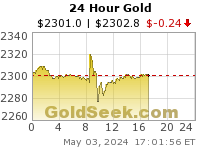Research proves wrong the idea that gold reliably rises during recessions, says EWI President Robert Prechter.
By Elliott Wave International
...If gold isn’t going up when the economy is contracting, when is it going up? Table 4 (see chart on p. 24 of this free Club EWI report -- Ed.) answers the question: All the huge gains in gold have come while the economy was expanding. This is true of the three most dramatic gold gains of the past century:(1) Congress changed the official price of gold from $20.67 to $35 per ounce in 1934, during an economic expansion. The gain against the dollar was 69 percent.
(2) The entire bull market from 1970 to 1980 occurred during an economic expansion... [Of] the $815 per ounce that gold rose from 1970 to 1980, $725 worth of it came while the economy was expanding.
(3) The entire bull market from 2001 to the present occurred during an economic expansion... [Of] the $748 per ounce that gold has risen since February 2001, $726 worth of it has come while the economy was expanding.
Even lesser rises in gold, such as the two big rallies during the 1980s, came during economic expansions. So the biggest gains in gold, by far, have occurred while the economy was in expansion, not contraction.
Why is such the case? Simple: During expansions, liquidity is available, and it has to go somewhere. Sometimes it goes into stocks, sometimes it goes into gold, and sometimes it goes into both. During times of extreme credit inflation, such as we have experienced over the past three decades, the moves in these markets during economic expansions are likewise extreme. When recession hits, liquidity dries up, and investors stop buying. During depressions, they sell assets with a vengeance.
Of course, we socionomists do not believe in the external causality of investment price movements. Recessions and expansions do not make investment prices move up and down. Fluctuations in social mood propel the economy, liquidity and movements in investment prices. So the only reason we bother with studies like this is to de-bunk various commonly held views of financial causality. Now we know: The idea that gold reliably rises during recessions and depressions is wrong; in fact, like most such passionately accepted lore, it’s backwards.
Finish reading this 16-chapter paper online now, free! Download Robert Prechter's FREE 40-Page Gold and Silver eBook. Here's what else you'll learn:
- Why Gold Is Still Money
- What Long Term Analysis of Gold Stocks Shows
- Study: Does Gold Always Go Up in Recessions and Depressions?
- True or False: Gold Is Better Than Stocks During Expansions
- What’s Next for Gold?
- Elliott Waves in the Silver Market
- MORE


No comments:
Post a Comment